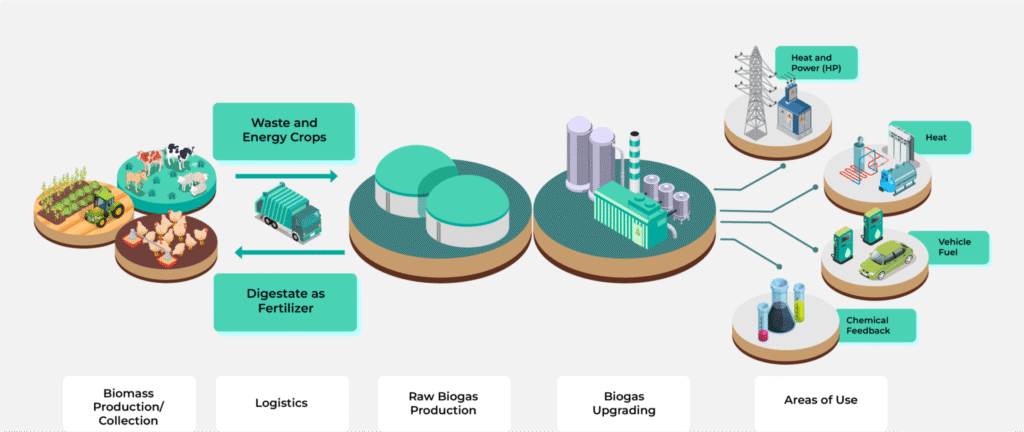Can you imagine the smelly organic waste from agricultural processing, animal manure, food scrap that feels unpleasant, could actually power homes, factories, and fuel for vehicles? This is biogas.
Biogas is a mixture of gases, produced when microorganisms, primarily bacteria, break down organic matter in the absence of oxygen, known as anaerobic condition. This gas mainly consists of methane (CH4) and carbon dioxide (CO2). Not only does it produce gas, but biogas also produces digestate as a by product that can be used for fertilizer. Since it is produced from organic sources, biogas is considered as renewable and clean energy.
Methane is the key component that gives biogas its heating value, making it an energy source. However, biogas typically contains only 50-75% methane, with the rest being carbon dioxide and other trace elements. This lower methane concentration means its heating value is less, if it compares with traditional fossil fuels. Therefore, to increase the energy content for wider application, biogas should be purified, reducing other elements and leaving only methane gas.
The purified or upgraded biogas is known as biomethane. In the US, it’s often referred to as Renewable Natural Gas (RNG). Biomethane boasts a methane content of over 90%, making its heating value comparable to conventional natural gas.
| Gas Composition | Heat Value | Unit |
| Biogas (60% CH4) | 5.100 | kcal/m3 |
| Biomethane (92% CH4) | 8.900 | kcal/m3 |
| Natural Gas | 9.000 | kcal/m3 |
Once upgraded, biomethane with similar properties to natural gas, becomes more versatile. It can be used in gas power plants, mixed with diesel in diesel power plants or in motor engines, or serve as a heating source for factories and homes. In addition, to ease transport process, biomethane can be compressed and stored in cylindrical tanks, known as Compressed Biomethane Gas (CBG). This allows biomethane to be used outside the production facility and gas pipeline network, offering flexible energy solutions for various needs.
Here at Amartya, we have extensive experience conducting both macro and micro level studies related to biogas and biomethane development. We’re committed to mainstream biogas and biomethane utilization. Contact us and be part of a more sustainable future.

